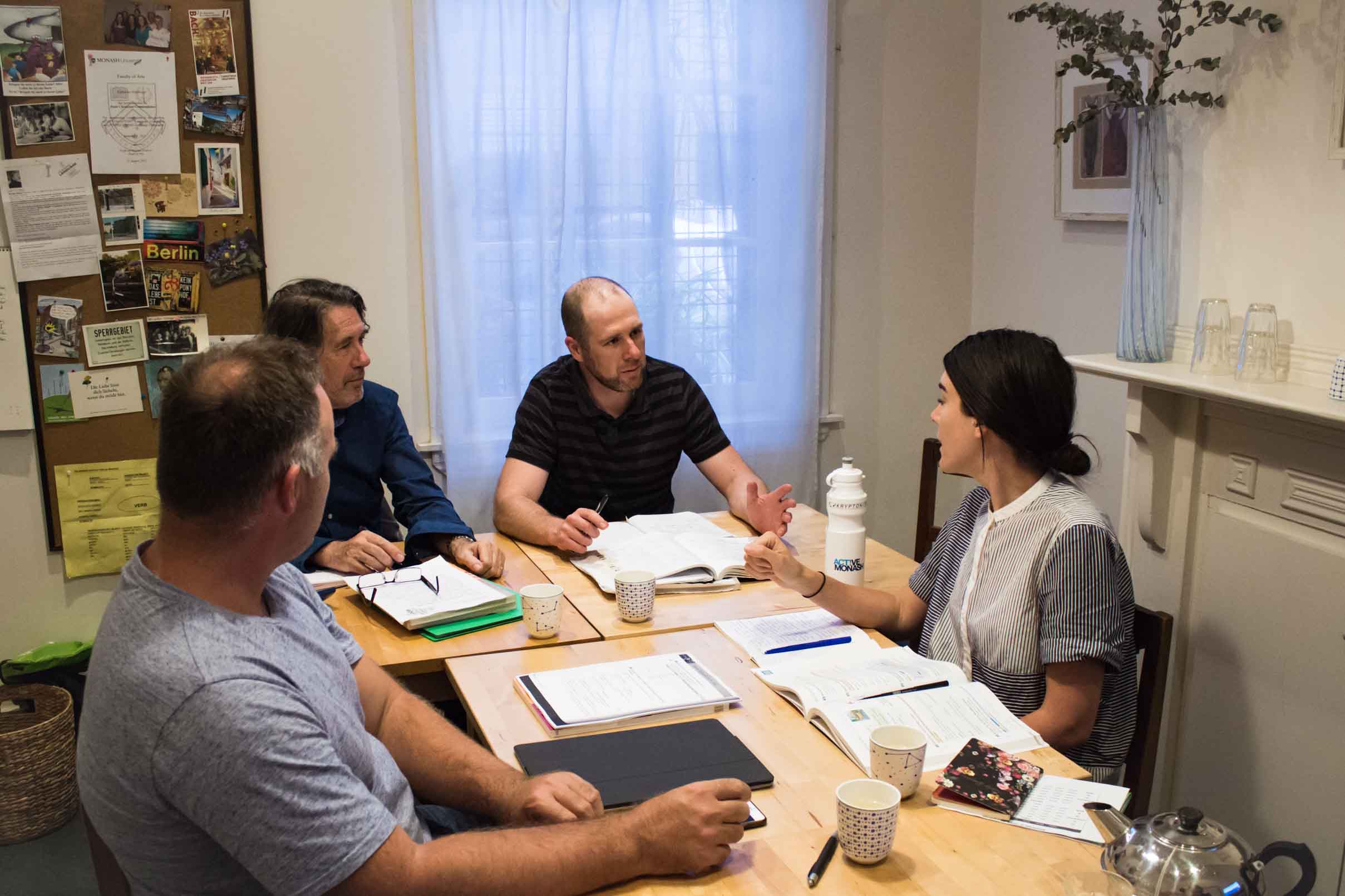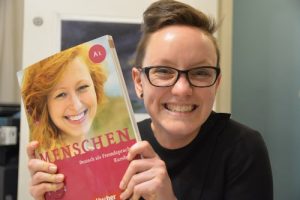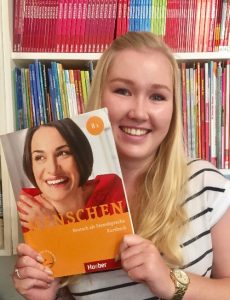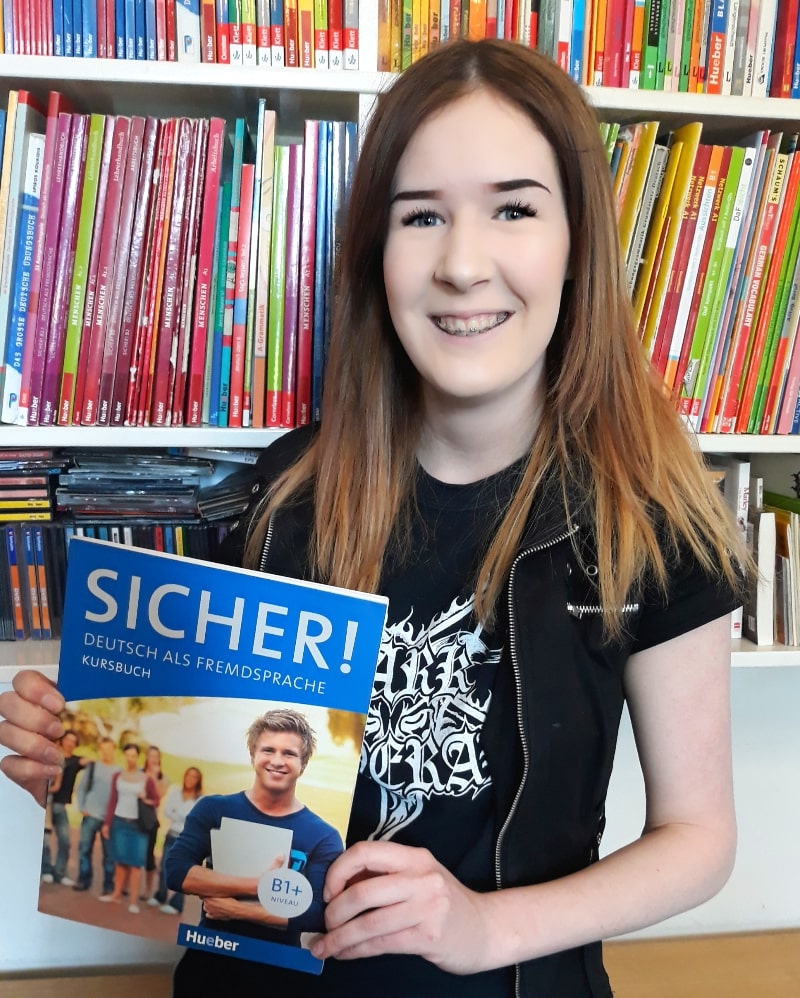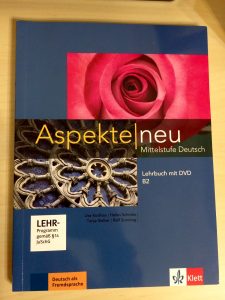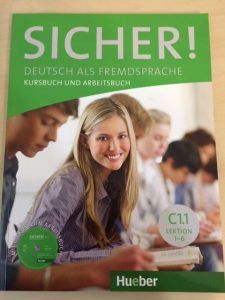German
Learn German
- German Courses
- Placement Tests
- Menschen A1
- Menschen A2
- Menschen B1
- Sicher B1+
- Sicher B2
- Aspekte B2
- Sicher C1
- Sicher C1/C2
Regular German Classes online, in house or mixed. Details on timetableLearn German with us at the East Melbourne Language Centre. Our regular evening and daytime language classes are conducted in four 10 week terms per year. We have classes for beginners, intermediate and advanced level students. Each session is for 90 minutes per week unless indicated otherwise. The fee for our online German evening and daytime group classes is $369.00 for the 10 week term. Each class will have a minimum of five students. All of our teachers have professional qualifications. They have many years of teaching experience and are native speakers. Learn more about Our Teachers View course Timetable |
|
Smaller German ClassesLearn German online in smaller classes of either 3 or 4 students per class. The course fee changes slightly for smaller classes. We offer these classes at different rates and conditions. Online classes with 4 students are $369 for a 9 week term. Online classes with 3 students are $369 for a 9 week term with 1.25 hours per week. Beginners to AdvancedBeginners (A1.1) start as Elementary 1 and go up to Elementary 5 (A 1.5). To complete the elementary levels it will take approximately 5 to 6 terms. Intermediate and advanced levels vary. We have many classes at all levels. If you are unsure about your level even after the placement test, you are able to try out different classes after enrollment (if places are available). Internationally recognized examinations can be taken from advanced levels. Please talk to us for a free informal assessment of your level and we will find a suitable class for you. German Private TuitionLearn German in Melbourne or any other city around the world in one-on-one classes online at $98.00 per 60 minutes. These classes are especially for busy people who want to learn a language but do not have the time to come in to our Language Centre. Rather than spending too much time traveling to get to your class, you can learn online via webcam. In conclusion, you practice your conversation and writing skills both at the same time. | German For TravellingFor travellers or interested learners with no or some very basic knowledge. Find your way around Germany with a few useful phrases. Learn about what to avoid and what to do to have a better experience. In this workshop you will learn:
You will also get useful tips and tricks to get the best out of your trip through Germany. Would you like to make up your own small group or have some individual workshop, tailored to your travel plans- night time or day time? We can arrange one-on-one tuition and semi/private (2-3 students) at flexible times, depending on the teachers and the students availability and can be booked outside our trading hours or on public holidays. |
German is just as easy as it sounds 🙂
Outline for A1 Elementary LevelsClick Here to Test Your Level (A1)The general guideline for A1 is the following:
A1.1 Elementary 1 is a 15-hour course for beginners.This course will take the students through general topics such as:
Grammar is taught in the context of using the language for a specific purpose.
A1.2 Elementary 2 is a 15-hour course.This course will take the students through general topics such as:
Grammar is taught in the context of using the language for a specific purpose.
A1.3 Elementary 3 is a 15-hour course.This course will take the students through general topics such as:
Grammar is taught in the context of using the language for a specific purpose.
A1.4 Elementary 4 is a 15-hour course.This course will take the students through general topics such as:
Grammar is taught in the context of using the language for a specific purpose.
A1.5 High Elementary 5 is a 15-hour course.This course will take the students through general topics such as:
Grammar is taught in the context of using the language for a specific purpose.
| Material: Menschen A1, Kursbuch and ArbeitsbuchAdditional Material: A1 Novel, Neuanfang mit SchokoladeCost: $29, incl Audio |
Outline for A2 Elementary LevelsClick Here to Test Your Level (A2)The general guideline for A2 is the following:
A2.1 Intermediate 1 is a 15-hour course.This course will take the students through general topics such as:
Grammar is taught in the context of using the language for a specific purpose.
A2.2 Intermediate 2 is a 15-hour course.This course will take the students through general topics such as:
Grammar is taught in the context of using the language for a specific purpose.Prepositions “über”, “von” and “an”
A2.3 Intermediate 3 is a 15-hour course.This course will take the students through general topics such as:
Grammar is taught in the context of using the language for a specific purpose.
A2.4 Intermediate 4 is a 15-hour course.This course will take the students through general topics such as:
Grammar is taught in the context of using the language for a specific purpose.
A2.5 High Intermediate 5 is a 15-hour course.This course will take the students through general topics such as:
Grammar is taught in the context of using the language for a specific purpose.
| Material: Menschen A2, Kursbuch and Arbeitsbuch
|
Outline for B1 LevelsClick Here to Test Your Level (B1)The general guideline for B1 is the following:
B1.1 Lower Advanced is a 15-hour course.This course will take the students through general topics such as:
Grammar is taught in the context of using the language for a specific purpose.
B1.2 Lower Advanced is a 15-hour course.This course will take the students through general topics such as:
Grammar is taught in the context of using the language for a specific purpose.
B1.3 Lower Advanced is a 15-hour course.This course will take the students through general topics such as:
Grammar is taught in the context of using the language for a specific purpose.
B1.4 Lower Advanced is a 15-hour course.This course will take the students through general topics such as:
Grammar is taught in the context of using the language for a specific purpose.
B1.5 Lower Advanced is a 15-hour course.This course will take the students through general topics such as:
Grammar is taught in the context of using the language for a specific purpose.
| Material: Menschen B1, Kursbuch and Arbeitsbuch
|
Outline for B1+ LevelsClick Here to Test Your LevelThe general guideline for B+1 is the following:
B1.1+ Lower Advanced is a 15-hour course.This course will take the students through general topics such as:Thema: KENNENLERNEN
Thema: FESTE
Grammar is taught in the context of using the language for a specific purpose.
B1.2+ Lower Advanced is a 15-hour course.This course will take the students through general topics such as:Thema: UNTERWEGS
Thema WOHNEN
Grammar is taught in the context of using the language for a specific purpose.
B1.3+ Lower Advanced is a 15-hour course. This course will take the students through general topics such as:Thema: BERUFSEINSTIEG
Thema: MUSIK
Grammar is taught in the context of using the language for a specific purpose.
B1.4+ Lower Advanced is a 15-hour course.This course will take the students through general topics such as:Thema: GELD
Thema LEBENSLANG LERNEN
Grammar is taught in the context of using the language for a specific purpose.
| Material: Sicher B1+, Kursbuch and Arbeitsbuch
|
Outline for B2 LevelsClick Here to Test B2.1 LevelClick Here to Test B2.2 LevelThe general guideline for B2 is the following:
B2.1 Lower Advanced is a 15-hour course.This course will take the students through general topics such as:Thema: FREUNDE
Thema: IN DER FIRMA
Grammar is taught in the context of using the language for a specific purpose.
B2.2 Lower Advanced is a 15-hour course.This course will take the students through general topics such as:Thema: MEDIEN
Thema: NACH DER SCHULE
Grammar is taught in the context of using the language for a specific purpose.
B2.3 Lower Advanced is a 15-hour course.This course will take the students through general topics such as:Thema: KÖRPERBEWUSSTSEIN
Thema STÄDTE ERLEBEN
Grammar is taught in the context of using the language for a specific purpose.
B2.4 Lower Advanced is a 15-hour course.This course will take the students through general topics such as:Thema: BEZIEHUNGEN
Thema: ERNÄHRUNG
Grammar is taught in the context of using the language for a specific purpose.
B2.5 Lower Advanced is a 15-hour course.This course will take the students through general topics such as:Thema: AN DER UNI
Thema: SERVICE
Grammar is taught in the context of using the language for a specific purpose.
B2.6 Lower Advanced is a 15-hour course.This course will take the students through general topics such as:Thema: GESUNDHEIT
Thema: SPRACHE UND REGIONEN
Grammar is taught in the context of using the language for a specific purpose.
| Material: Sicher B2+, Kursbuch und Arbeitsbuch
|
Course Outline Second Advanced B2 Aspekte Tuesday 6pmClick Here to Test Your LevelFind out your level by taking a placement Test: Start TestThe general guideline for B2 is the following:
B2.1 Second Advanced is a 15-hour course.This course will take the students through general topics such as:Thema: HEIMAT IST …
Thema: SPRICH MIT MIR!
Grammar is taught in the context of using the language for a specific purpose.
B2.2 Second Advanced is a 15-hour course.This course will take the students through general topics such as:Thema: ARBEIT IST DAS HALBE LEBEN?
Thema: ZUSAMMEN LEBEN
Grammar is taught in the context of using the language for a specific purpose.
Strategien:
B2.3 Second Advanced is a 15-hour course.This course will take the students through general topics such as:Thema: WER WISSEN SCHAFFT, MACHT WISSENSCHAFT
Thema: FIT FÜR …
Grammar is taught in the context of using the language for a specific purpose.
Strategien:
B2.4 Second Advanced is a 15-hour course.This course will take the students through general topics such as:Thema: KULTURWELTEN
Thema: DAS MACHT(E) GESCHICHTE
Grammar is taught in the context of using the language for a specific purpose.
Strategien:
B2.5 Second Advanced is a 15-hour course.This course will take the students through general topics such as:Thema: MIT VIEL GEFÜHL …
Thema: EIN BLICK IN DIE ZUKUNFT
Grammar is taught in the context of using the language for a specific purpose.
Strategien:
| Material: Aspekte B2, Kursbuch und Arbeitsbuch
|
Outline for C1.1 LevelClick Here to Test Your Level (C1)The general guideline for C1 is the following:
C1.1 Higher Advanced is a 15-hour course.This course will take the students through general topics such as:Thema: MODERNES LEBEN
Thema: TOURISMUS
Grammar is taught in the context of using the language for a specific purpose.
C1.2 Higher Advanced is a 15-hour course.This course will take the students through general topics such as:Thema: INTELLIGENZ UND WISSEN
Thema: MEINE ARBEITSSTELLE
Grammar is taught in the context of using the language for a specific purpose.
C1.3 Higher Advanced is a 15-hour course.This course will take the students through general topics such as:Thema: KUNST
Thema: STUDIUM
Grammar is taught in the context of using the language for a specific purpose.
| Material: Sicher C1.1, Kursbuch und Arbeitsbuch
|
Outline for C1/C2 levelsClick Here for C1.1 TestClick Here for C1.2 TestWir orientieren uns in diesen Kursen an den Vorlieben und Bedürfnissen der Teilnehmer. Eine Umfrage zu Beginn eines Terms entscheidet, welche Themen und welche Grammatik behandelt werden. Wir benutzen diverse Medien, z.B. Spiegel, Zeit, Stern, Sueddeutsche, FAZ, Tagesspiegel, Taz, Welt, auch die ZDF und ARD Mediatheken sowie Deutsche Welle und SBS Radio und Fernsehen. Ein typisches Term sieht so aus: Themen
Grammatik
|
|

